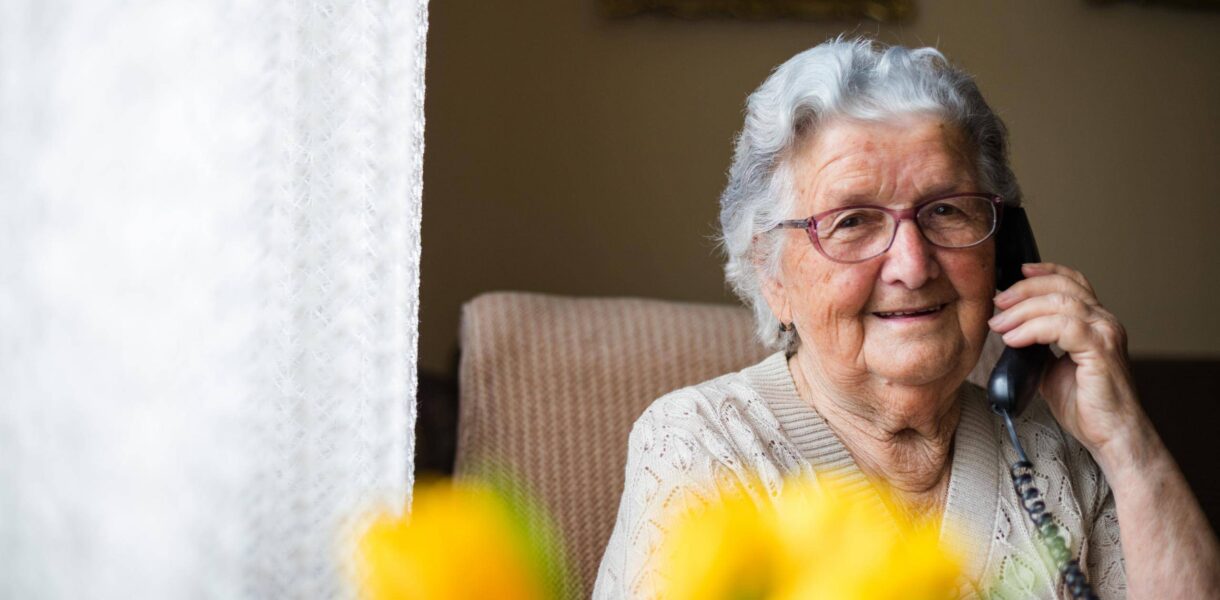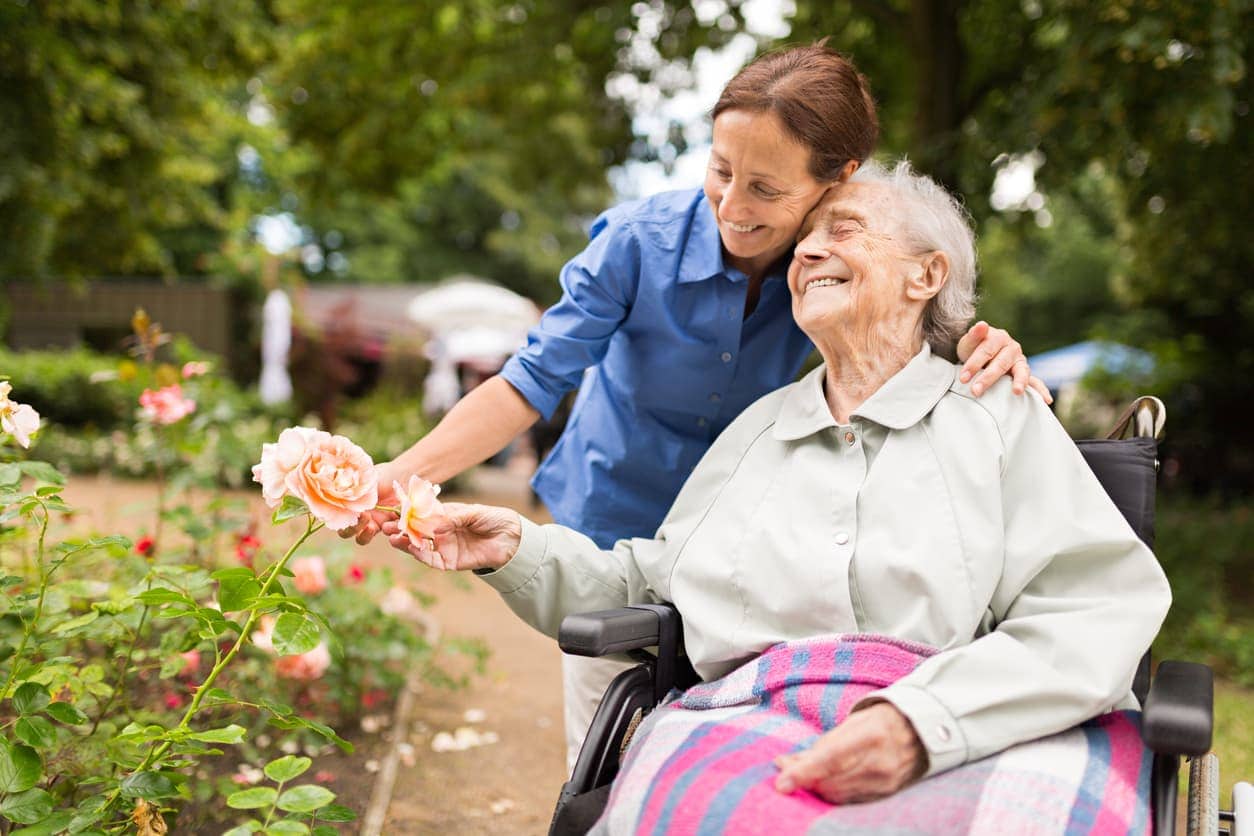
Long Distance Caregiving: How to help from afar
Living far from our parents might present an unforeseen challenge when they begin to age and need more assistance. While we want to be physically present to help them each day, it might not be an option when jobs are located hundreds of miles away from where an elder parent or parents live.
Most caregivers are in their late 40s, working on the middle of their careers, and sandwiched between responsibilities in their own home and those of a senior parent(s). It can feel overwhelming to juggle it all.
Having a plan in place is a good way to prepare for any health, mobility, or cognitive situations that arise. The following are some tips that can get you started.
Make a Contact List
Brainstorm a list of people both you and your parents trust. Begin with the obvious family members and friends, then branch out. Especially if your parents are homebodies and don’t interact much with the outside world, you’ll have to get a little creative.
- Family: This includes relatives who live close by, like your siblings, your parents’ siblings, and any other members of the family who are responsible and trustworthy.
- Friends: If your parents have a core group they socialize with, get their contact info in case you need them to check on your parents in the future. This can be church friends, book club members, or old college buddies who live in town. Even add your own local friends to the list.
- Neighbors: A trusted neighbor is a wonderful lookout for an elder parent. Find out who lives close and has a friendly rapport with your parents. Introduce yourself and exchange phone numbers. In the case of an emergency, they might be the first ones on the scene to check on your mom or dad.
- Therapists, hairstylists, or other professionals: If your parent regularly visits a masseuse, nail tech, or physical therapist, they might have a longstanding relationship that you can utilize as a long distance caregiver. Many of these professionals spend years with their clients and build a nurturing bond with those that they treat. And many would check on their senior clients in a heartbeat. Make sure you know their contact information.
- Physicians: A trusted doctor is a great resource to keep handy. Ask your parent for permission to discuss their health and wellbeing with their physician and/or nurse. At the very least, offer to be on the emergency contact list at their doctor’s office.
Communicate with Your Loved One Frequently
When you live out-of-town, it’s important to call and/or text your parent often. Make a note of their routine, and if possible, call them every day at the same time. It’s not only a safeguard, but something they’ll look forward to. Here’s a list of things to check on:
- Ask them how they’re feeling, if they are in need of any healthcare or renewed prescriptions.
- Offer to order any supplies they need or schedule any professional house repair services.
- Remind them to keep their doors locked and reiterate any other safety measures of concern.
- Get their schedule for the week; any appointments, outings with friends, or errands.
- Talk about something fun, like a movie they might like or an old memory that will bring them joy.
Teach Them Tech
Some seniors are very tech-savvy, while others resist any new gadget. However your loved one feels about it, it’s important to modernize their means of communication for their ease and safety.
- Get them a smartphone. Then, type out simple instructions in large font for how to make a call, how to text, and how to look up important info.
- Set them up on video chat, like FaceTime. If they’re hesitant, explain the benefits and show them how to use it, so they’re not on video when they don’t want to be.
- Install smart lights or even simple lamp timers to make life a little easier and their home more secure.
- Share shortcuts to using remotes, streaming apps, and safely signing into online accounts.
- Add security devices to their home, like a video doorbell or indoor cameras to periodically check on them. The FakeTV is a wonderful burglar deterrent you can program to play for several hours or all night.
Shop For Their Groceries Online
With food delivery services making life so much more convenient, your parent doesn’t have to leave the house to have their food and toiletries delivered. You can even get them on a subscription service for household staples to arrive weekly or monthly.
If your parent wants to be in charge of what they purchase, show them how to use Instacart, DoorDash, or Amazon Prime. Other services to set up online:
- Prescription delivery
- Virtual doctor visits
- Zoom calls with an estate attorney or accountant
Compile Important Paperwork
As a long distance caregiver, it’s essential to be organized and have important documents ready when needed. Make a digital and paper file of financial, estate, and health records. Here’s a list:
- Bank accounts, including checking, savings, certificates of deposit, savings bonds, pensions, 401K, IRAs, and other investments
- Credit cards, with payment due dates and any balances
- Health records: Allergies, conditions, immunizations, prescriptions, hearing or mobility aids, cognitive issues, and doctors’ information
- Last Will and Testament, living will, and any other advance directive
- Mortgage balance and payment information, and other outstanding bills
- Copies of house deeds, car titles, and any relevant court documents
- Computer and account passwords
- Codes to safes or keys to safety deposit boxes
- Set of house keys and car keys
- Security alarm codes and secret words
- Important heirlooms and history they wish to be kept in the family
- Funeral or Celebration of Life wishes to be carried out
Share the Caring
If you live long distance, collaborate with another family member(s) to share the duties in supporting your aging parent. We know it can be difficult to coordinate schedules (and sometimes personalities!), but if others are willing to work with you, it might be truly beneficial for the entire family.
- If your work schedule is flexible, travel home and work from your parent’s house for a week or two. This could help relieve a sibling who’s caregiving full-time or you could alternate with a brother or sister who also lives out-of-town.
- Bring your parent to your home for the summer or during the holidays. If you have the room and resources, it’ll put your mind at ease and give you both quality time together.
- Depending on the distance, consider visiting your parent on the weekends, while their full-time caregiver handles the weekly duties.
- Pay a trusted friend to sit with your parent during the evenings or on designated afternoons.
- Consider splitting your parent’s time between you and other siblings by having your parent live at your home for a year, then your sister’s home for the next year, and so on. This isn’t a feasible solution for everyone, but some siblings have made it work.
Get to Know Your Loved One’s Primary Caregiver
Even if it isn’t your first choice, you may have to concede and hire someone full-time to care for your parent. Do a lot of research, meet with potential caregivers, and trust your intuition in making this very important decision. Never choose someone in haste, but get references and certifications to ensure your parent’s caregiver is qualified, compassionate, and honest.
Once you’ve secured the best caregiver, check in with them often through video chats and texts. You’ll want to make sure they’re responsive and reply back in a timely, respectful manner.
If you need more personalized advice for your senior, Avalon Memory Care is always available as a helpful resource for your family. We take elder care to heart, focusing on a custom plan for each person. To get more information, please reach us at (972) 713- 1383 or (888) 522-1918.
Sources:
https://www.nia.nih.gov/health/eight-tips-long-distance-caregiving
https://www.usaging.org/caregivers
https://eldercare.acl.gov/Public/Resources/BROCHURES/docs/Long-distance-brochure.pdf
https://acl.gov/programs/support-caregivers/national-family-caregiver-support-program
https://respectcaregivers.org/long-distance-caregiving/
https://www.alz.org/help-support/caregiving/care-options/long-distance-caregiving
https://www.aarp.org/caregiving/basics/info-2019/long-distance-care.html
See More Articles
-
Visiting Your Aging Parent With Memory Loss at Avalon Memory Care
As a loving son or daughter, you naturally want the best of care for your senior parent. The compassionate assisted living caregivers at Avalon Memory Care want you to know that while your parent is living with us, he or she will receive nothing less than respectful, loving care within our comfortable, safe, and fully-staffed
-
Celebrating New Year’s Day in Memory Care
Families often find that celebrations with their loved ones in memory care are easier when they embrace new traditions. For instance, it may not be practical to expect your loved one to stay up until midnight on New Year’s Eve. Instead, consider throwing a New Year’s Day celebration, complete with a countdown to the first
-
Understanding Parkinson’s Disease and Dementia
Parkinson’s disease is an incurable neurological disorder, with progressively worsening complications. Perhaps the most well-known symptom of Parkinson’s is a hand tremor, but it can also cause speech changes, muscle rigidity, and impaired posture. Eventually, as the disease progresses, more than half of all individuals with Parkinson’s will require dementia care. This particular type of
Testimonials
Downloadable Resources
We Are Avalon
Discover the heart of our community; download ‘We Are Avalon’ to get to know our dedicated team and our commitment to providing a warm, family-like environment.
Transitional Care Guide
If you’re considering a transition, we’re here to help; download our Transitional Care Guide for compassionate guidance through each step of the process.
Schedule a Tour
Visit one of our 30+ campuses and experience our unique approach to memory care.












